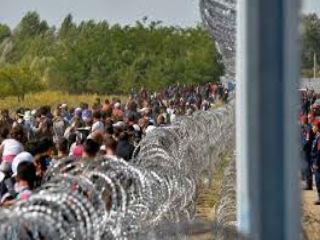In 2015, Europe experienced its highest number of refugees since the Second World War, with Syria the number one "supplier", due to the conflict there

The portrait of the ”dangerous and violent” refugee enjoyed some of the headlines, with a particularly media frenzy as regards the fake case of the Russian girl in Germany. Indeed, one of the main sources of propaganda is Russia and Putin is said to be seeking to ”sow the seeds of discord in Europe by weakening Germany and Angela Merkel”, according to German intelligence sources quoted by Sueddeutsche Zeitung as well as the NDR and WDR television networks.
by
Radu Magdin*
A high number of Syrians gave up on the idea of going back to their normal life before the war so they decided to seek asylum in Europe, furthermore as tragedies continued on the ground. Even if the EU has pumped a lot of money in border security technology, it still fell short when it comes to being prepared to receive such an influx of refugees. A refugee normally has to stay in the first country that he or she arrives into, a phenomenon that puts a lot of pressure on the countries that are already in economic trouble such as Greece; refugee routes targeted directly the Schengen space, and the idea of mandatory quotas was brought up. But the EU has both the economical means of managing this crisis, the problem is more one related to social integration of a large wave of refugees. This is where perceptions and strategic communications come in, and so does foreign propaganda: a fear game on refugees, their integration and their possible motives to commit crimes came in the public arena the past few months.
For example, in an interconnected global media space, the main idea stressed out by the media, particularly in countries such as Russia, but also in other EU countries, is the focus on crime and religion, as well as the collapse of the social systems. However, statistics say that even if the EU were to bring in 4 million refugees, the percentage of Muslims would only rise from 4% to 5% in the European population: so no "Islamisation of Europe" is happening. One of the main concerns that the Europeans have is the propagandistic idea that the immigrants will increase the birth rates and that new comers might end up overtaking the natives in a matter of decades. Contrary to popular belief, statistics show that even if the Muslim population is prone to have more children than non-Muslims, this trend decreases as the standard of living and education rises. So, integration is always key, and so are living conditions, not to mention that young people need less social security help: the workforce the refugees will provide will not only boost the economy but will also fill in the gaps and sustain Europe's ageing population. Not all immigrants joining the wave are actual refugees, so Europe will not be and cannot be everyone's refuge: where there is no case for a refugee status, a person will have to go back.
The portrait of the "dangerous and violent" refugee enjoyed some of the headlines, with a particularly media frenzy as regards the fake case of the Russian girl in Germany. Indeed, one of the main sources of propaganda is Russia and Putin is said to be seeking to "sow the seeds of discord in Europe by weakening Germany and Angela Merkel", according to German intelligence sources quoted by Sueddeutsche Zeitung as well as the NDR and WDR television networks. Judy Dempsey, an analyst with the Carnegie Foundation Europe, has, in our view, a good case saying that "Putin is using the refugee crisis to weaken Merkel" and that there is a "direct correlation"between the support of the Kremlin chief to its Syrian ally Bashar al-Assad and the declining popularity German Chancellor home. Moreover, the hostile approach towards the refugees is really popular with, and is making popular the right-wing parties in a number of EU member states (surprise: parties partly funded by Russia) and their agenda is definitely saying a big "NO!" to opening up the borders. They in fact deny most of Europe's achievements, and the refugee crisis is a good excuse.
What can be done against negative media spinning? A lot of things, from consistent and careful journalist reporting - to avoid propaganda or misleading information, to myth-busting as regards refugees. Helping people that are fleeing a war they did not start nor seek is not only our moral duty but it is also the right and humanitarian thing to do. Of course, if some of these people commit crimes in our States, they should be punished according to our laws, but that does not mean that the refugee wave should be viewed as threat, but as an opportunity. History will make its case for the humane solution and a diverse Europe.
*Radu Magdin is an analyst and consultant, Vicepresident of Strategikon, a Romanian English speaking think tank. This article is also part of a collection of articles dedicated to "What our fear of refugees says about Europe and the way forward in European policy approach: Balkan Young Leaders' Perspectives" by European Expression and EU Policy Hub.




 By: N. Peter Kramer
By: N. Peter Kramer

